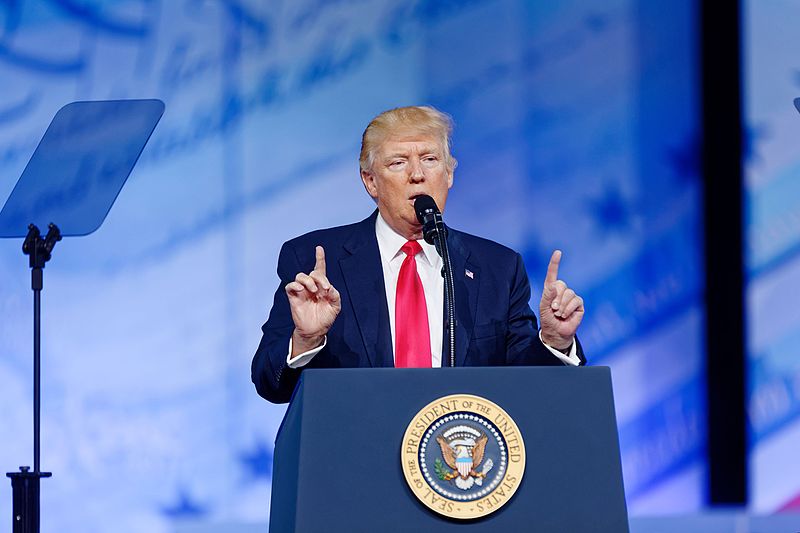Former President Donald Trump’s businesses and properties are under scrutiny as of late, especially his properties in New York. The town of Ossining has received two subpoenas from two probes into the former president’s Westchester golf course.
According to The Daily Beast, Ossining has valued Trump’s golf course in Westchester at around $15 million since 2016. However, the Trump Organization has tried to lower its value every year despite having declared on White House financial disclosures that the property was worth over $50 million. New York Attorney General Letitia James and Westchester District Attorney Mimi Rocah have since subpoenaed records from the Ossining town clerk’s office.
A copy of the official complaints the Trump Organization filed against the town obtained by the outlet, it showed the company’s attempts to get a tax break. This included one challenge that listed the property’s value to $7.5 million, which is less than half the town’s estimated value of $15 million. The general manager signed off on a similar challenge on the former president’s birthday on June 14, 2017, the same day Trump signed an official government disclosure that valued the property at $50 million.
In 2018, the former president’s son Donald Trump Jr signed papers that claimed the golf course’s value dropped by $1 million, despite his father continuing to value the property at over $50 million in forms turned in to the Office of Government Ethics. Trump Organization CFO Allen Weisselberg signed off on the $6.5 million assessment in 2019 and 2020.
According to the report, the former president may be personally implicated if he inflated the value of his assets in the government disclosure forms.
Trump is also involved in several lawsuits, and the latest one was filed by his former fixer Michael Cohen. Cohen sued the former president along with his former DOJ attorney general Bill Barr for trying to deny his First Amendment rights. When Cohen was detained during the pandemic, he was told that he would have to sign a statement that promised he would not publish his book until he served his prison term, which is after Trump’s presidency.
The statement also demanded that Cohen would not speak to the press. When Cohen refused, he was placed back in prison for house arrest.
“I make the finding that the purpose of transferring Mr. Cohen from home confinement to jail is retaliatory and it’s retaliatory because of his desire to exercise his First Amendment rights to publish a book,” said Senior US District Judge Alvin Hellerstein.



 U.S.-Israel Strike on Iran Escalates Middle East Conflict, Trump Claims Khamenei Killed
U.S.-Israel Strike on Iran Escalates Middle East Conflict, Trump Claims Khamenei Killed  Trump Announces U.S. Strikes on Iran Navy as Conflict Escalates
Trump Announces U.S. Strikes on Iran Navy as Conflict Escalates  Trump Says U.S. Combat Operations in Iran Will Continue Until Objectives Are Met
Trump Says U.S. Combat Operations in Iran Will Continue Until Objectives Are Met  Trump Launches Operation Epic Fury: U.S. Strikes on Iran Mark High-Risk Shift in Middle East
Trump Launches Operation Epic Fury: U.S. Strikes on Iran Mark High-Risk Shift in Middle East  Why did Iran bomb Dubai? A Middle East expert explains the regional alliances at play
Why did Iran bomb Dubai? A Middle East expert explains the regional alliances at play  Argentina Tax Reform 2026: President Javier Milei Pushes Lower Taxes and Structural Changes
Argentina Tax Reform 2026: President Javier Milei Pushes Lower Taxes and Structural Changes  Iran Supreme Leader Ayatollah Ali Khamenei Killed in Israeli, U.S. Strikes: Reuters
Iran Supreme Leader Ayatollah Ali Khamenei Killed in Israeli, U.S. Strikes: Reuters  Russia Signals Openness to U.S. Security Guarantees for Ukraine at Geneva Peace Talks
Russia Signals Openness to U.S. Security Guarantees for Ukraine at Geneva Peace Talks  Marco Rubio to Brief Congress After U.S.-Israeli Strikes on Iran
Marco Rubio to Brief Congress After U.S.-Israeli Strikes on Iran  AI is already creeping into election campaigns. NZ’s rules aren’t ready
AI is already creeping into election campaigns. NZ’s rules aren’t ready  Netanyahu Suggests Iran’s Supreme Leader Khamenei May Have Been Killed in Israeli-U.S. Strikes
Netanyahu Suggests Iran’s Supreme Leader Khamenei May Have Been Killed in Israeli-U.S. Strikes  Failure of US-Iran talks was all-too predictable – but Trump could still have stuck with diplomacy over strikes
Failure of US-Iran talks was all-too predictable – but Trump could still have stuck with diplomacy over strikes  Middle East Conflict Escalates After Khamenei’s Death as U.S., Israel and Iran Exchange Strikes
Middle East Conflict Escalates After Khamenei’s Death as U.S., Israel and Iran Exchange Strikes  U.S. Deploys Tomahawks, B-2 Bombers, F-35 Jets and AI Tools in Operation Epic Fury Against Iran
U.S. Deploys Tomahawks, B-2 Bombers, F-35 Jets and AI Tools in Operation Epic Fury Against Iran  Pentagon Leaders Monitor U.S. Iran Operation from Mar-a-Lago
Pentagon Leaders Monitor U.S. Iran Operation from Mar-a-Lago  Trump to Address Nation as U.S. Launches Strikes in Iran, Axios Reports
Trump to Address Nation as U.S. Launches Strikes in Iran, Axios Reports 































